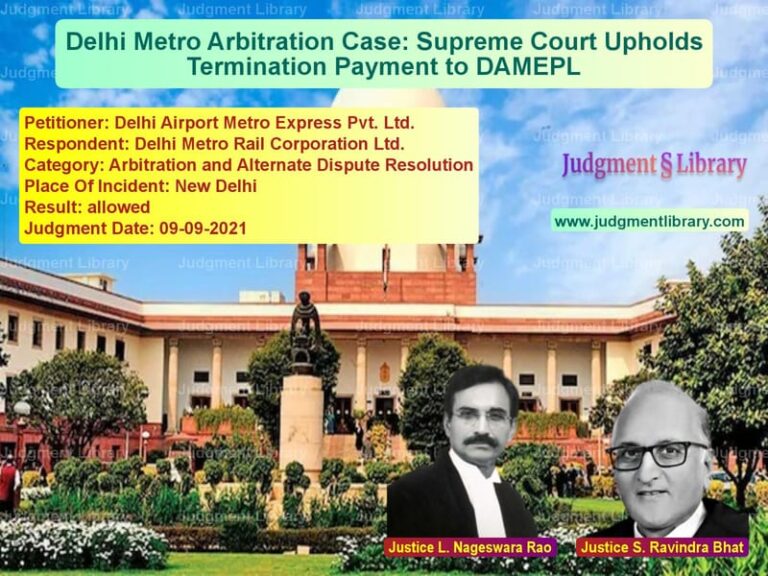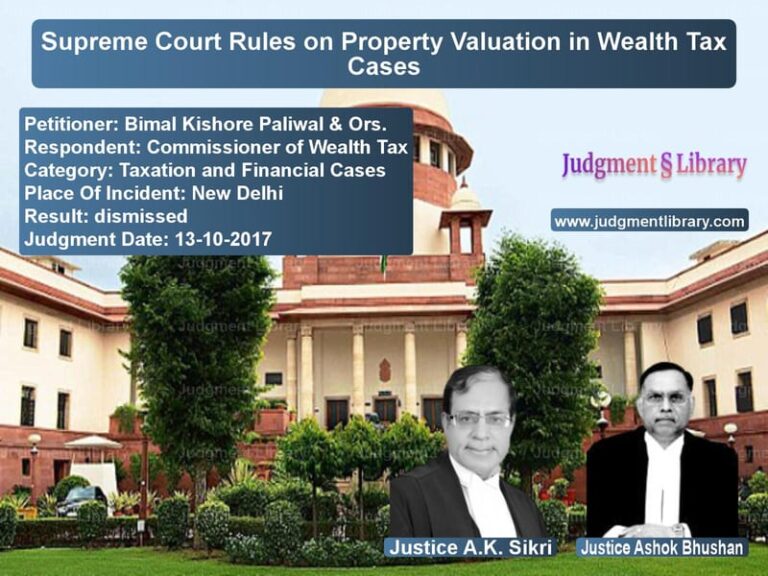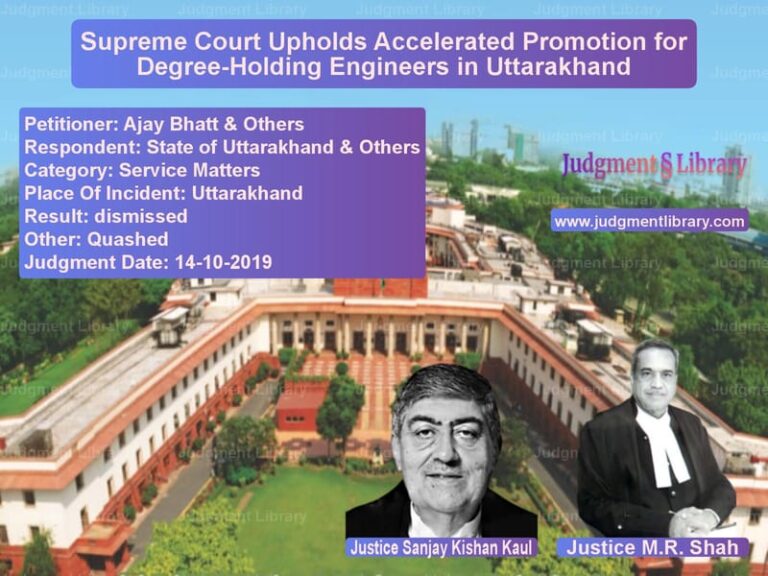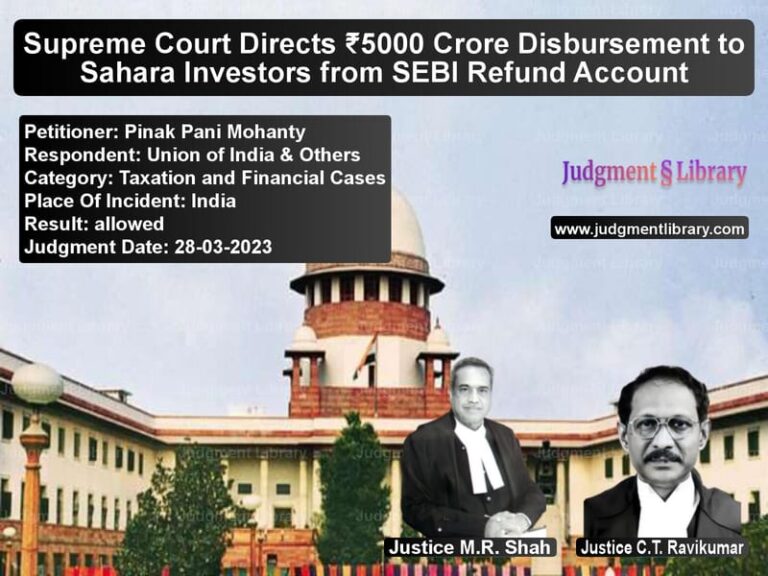Supreme Court Restores Auction Sale in State Bank of India Loan Dispute
The Supreme Court of India, in the case of State Bank of India & Anr. vs. Metta Chandra Sekhar Rao & Ors., delivered a significant judgment on October 30, 2017, concerning the validity of a mortgage and an auction sale conducted by the bank to recover outstanding dues. The Court overturned the decision of the High Court, which had nullified the sale proceedings, reinstating the rights of the auction purchaser.
The case revolved around a mortgage loan obtained by the respondent, Metta Chandra Sekhar Rao, from the State Bank of India (SBI). Due to default in repayment, the bank initiated recovery proceedings and auctioned the mortgaged property. The High Court of Hyderabad had previously set aside the auction sale, ruling that the mortgage was invalid due to a defect in the documentation process. The Supreme Court, however, disagreed with this finding and reinstated the auction sale, emphasizing procedural fairness and protecting the rights of the auction purchaser.
Petitioner’s Arguments
The petitioners, State Bank of India and the auction purchaser, contended that:
- The mortgage was validly executed, and the borrower had availed of the loan without any objections at the time of execution.
- The borrower had waived his rights under Sections 61, 65A, and 67A of the Transfer of Property Act, 1882, through a letter dated May 28, 2011, acknowledging the validity of the mortgage.
- The High Court erred in holding that the waiver of rights required registration to be legally effective.
- The mortgage had been acted upon, and the loan was sanctioned based on the collateral security.
- The auction purchaser was an innocent third party who had legally acquired the property in good faith and had already made financial investments in it.
Respondent’s Arguments
The respondent, Metta Chandra Sekhar Rao, argued that:
- The mortgage was not legally enforceable as the waiver of rights was not registered, making the mortgage defective.
- The auction sale was conducted unfairly, as the validity of the mortgage itself was in question.
- The High Court correctly set aside the sale proceedings to prevent an unlawful transfer of property.
- Allowing the auction to stand would create a precedent where defective mortgages are upheld.
Key Observations by the Court
The Supreme Court ruled in favor of the petitioners, emphasizing that the High Court erred in invalidating the mortgage and the auction sale. The bench observed:
“The issue with regard to validity of the mortgage on the strength of which the loan was sanctioned and obtained was not raised at any point of time in any of the earlier proceedings. It was so raised for the first time before the High Court. The High Court, in our considered view, therefore, ought not to have gone into the said question at such a belated stage.”
The Court further noted:
- The mortgage was duly acted upon, and both parties had benefited from it.
- Setting aside the auction sale would unfairly prejudice the auction purchaser, who had acquired the property legally.
- The respondent had ample opportunities to contest the mortgage’s validity earlier but failed to do so.
- The mortgage covered multiple properties, and the sale of other mortgaged properties had already attained finality.
Final Judgment
The Supreme Court ruled:
“For all the aforesaid reasons, we are of the view that the conclusion of the High Court is not tenable in law. We accordingly allow this appeal and set aside the order of the High Court.”
The Court also affirmed the rights of the auction purchaser, stating:
“The auction purchaser is an innocent third party who, it is stated, has obtained a loan to pay the sale price and is presently servicing the said loan. It is also stated that the auction purchaser is in possession of the property since March 2016 and has spent a considerable amount of money in renovating/repairing the premises in question.”
Implications of the Judgment
This ruling has several significant implications:
- It upholds the validity of mortgages executed through waiver letters, even if they are not registered.
- It protects the rights of auction purchasers who buy properties in good faith.
- It prevents borrowers from belatedly challenging the validity of mortgages after benefiting from them.
- It ensures that financial institutions can recover dues through lawful auction sales without undue judicial interference.
Conclusion
The Supreme Court’s ruling in this case reinforces the importance of procedural fairness and financial discipline in loan transactions. By restoring the auction sale, the Court upheld the principles of contractual obligations, ensuring that borrowers cannot evade their liabilities through delayed legal challenges.
This judgment sets a precedent for similar cases where borrowers attempt to invalidate mortgages after defaulting on loans. It also reassures financial institutions and auction purchasers that legitimate transactions will be upheld, ensuring stability in banking and property markets.
Don’t miss out on the full details! Download the complete judgment in PDF format below and gain valuable insights instantly!
Download Judgment: State Bank of India vs Metta Chandra Sekhar Supreme Court of India Judgment Dated 30-10-2017.pdf
Direct Downlaod Judgment: Direct downlaod this Judgment
See all petitions in Debt Recovery
See all petitions in Property Disputes
See all petitions in Banking Regulations
See all petitions in Judgment by Ranjan Gogoi
See all petitions in Judgment by Navin Sinha
See all petitions in allowed
See all petitions in supreme court of India judgments October 2017
See all petitions in 2017 judgments
See all posts in Civil Cases Category
See all allowed petitions in Civil Cases Category
See all Dismissed petitions in Civil Cases Category
See all partially allowed petitions in Civil Cases Category







